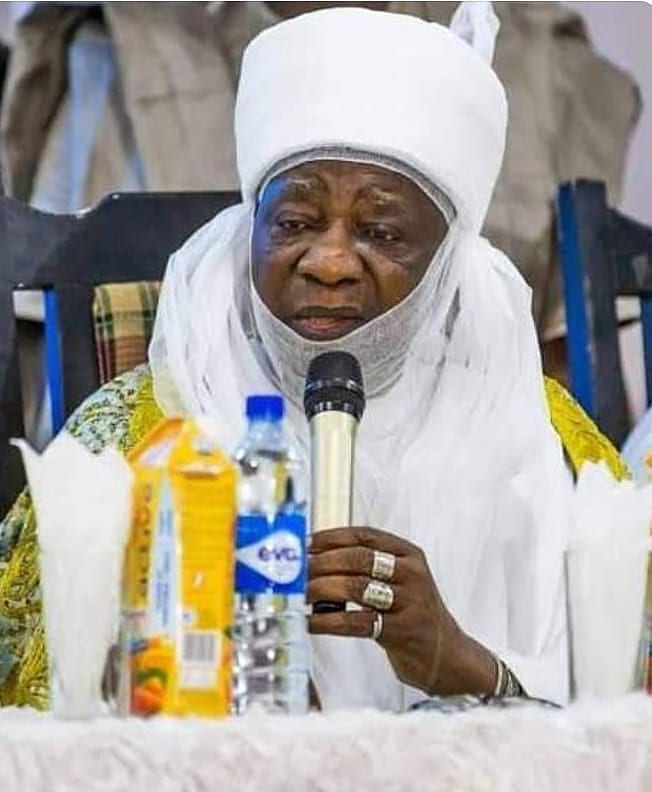By Prof Hassan Saliu
This occasion marks a significant development in the Ilorin Emirate and Kwara State. To properly understand this tribute, it is necessary to go historically by virtue of the stool that he occupies as the Emir of Ilorin.
The first fact to know about the revered Emir is that he ascended the throne as the most learned person to occupy the Emir’s stool of Ilorin. He was a former justice of the Court of Appeal before destiny beckoned him to be the Emir in 1995. He is a descendant of Emir Abdusalami, who came to power after the establishment of the Emirate and after the death of his father, Sheikh Solihu Ibn Junta, who laid the foundation for the Ilorin Emirate.
More directly, one can mention the name of Emir Shuaibu Bawa, who died in 1919 as the direct royal lineage of Dr. Ibrahim Sulu-Gambari CFR, the current Emir of Ilorin. Emir Bawa had two sons, Abdulkadir and Laofe, among others. The former became the 8th Emir after Emir Shuaibu Bawa. He ruled for four decades and was succeeded by Emir Zulkarnain Gambari in 1959 as the 9th Emir of Ilorin. He was succeeded by the 10th Emir, Abdulkadir Aliyu in 1992. Then the subject of this tribute as the 11th Emir in 1995.
Another point to know from the outset about the 11th Emir of Ilorin is that, apart from being the successor to the 10th Emir, he shares family ties with four other previous Emirs. His great-great-grandfather was an Emir, his great grandfather was an Emir, and his father was also an Emir. His mother was also the daughter of another Emir of Ilorin.
I argue that the history of Ilorin is not complicated to relate to, but people have made it so. Going by the history of migration, there have been noteworthy epochs in the evolution of towns and cities that everyone has to relate to in one way or another. Ilorin’s history has followed the same pattern. Migrations have dotted its history, and conquests at different epochs involved different personalities with diverse motives.
Because of the recourse to primarily oral traditions, the recollections about Ilorin have suffered some gaps and significant distortions. The various ethnic groups that came to Ilorin at different times have entirely accepted the reality of their existence and adopted the town as their home, notwithstanding their diverse ethnic backgrounds.
In the governance arrangement that has survived through thick and thin, every notable bloc is involved in the town’s administration under the Emir’s perfect control. The Emirate’s resilience was again tested in 1995 when royal family members filed out to contest for the next Emir of Ilorin position. At the end of the selection process, Alhaji Ibrahim Sulu-Gambari emerged as the Emir of Ilorin.
Since his ascension to the throne, the town has grown in leaps and bounds to the extent that Ilorin has expanded to neighbouring villages, with new settlements springing up now and then. This phenomenal expansion has not come as a surprise to many discerning residents of Ilorin, derived essentially from its location and astute administration by successive Emirs.
The 11th Emir began his educational journey in Ilorin in 1953 and later attended Offa Grammar School for his secondary education, which he completed in 1960. He travelled abroad to continue his education, first at Oakham and then at Westminster, and finished his higher education in 1963.
Still seeking more knowledge, he attended Middle Temple School and later the University of London for his law programme, completing it in 1969 and acquiring an LLB, BL, and LLM. Upon return to Nigeria, he was associated with leading law firms in Lagos before moving to the public judicial service and the bench.
He began his public career as a judicial officer in the services of the former North-Eastern State of Nigeria, where he rose rapidly to become the first Solicitor-General and Permanent Secretary in 1976. By 1977, he became an Acting Judge of the High Court for three states in the Northeast of Nigeria.
In 1983, he was appointed Justice of the Court of Appeal and posted to the Ibadan Division, where he served for eight years and interacted with notable Nigerians, including the late General Sani Abacha and others. He rose remarkably in the Court of Appeal and was rated one of the top justices.
The Emir has extended his services to other aspects of national life. He was the pioneer head of the Arewa Consultative Forum (ACF) during its formative years and a delegate to the national constitutional conference held under the Jonathan government.
His Royal Highness has served as the Pro-Chancellor of some universities, including the University of Agriculture, Makurdi, and Bayero University, Kano. In recognition of his contributions to nation-building, he has been given a national honour in the category of CFR.
As Chairman of the Kwara State Traditional Council, he has ensured peace and enhanced respectability for the traditional institution. One enduring legacy of his is that the processes of succession to traditional stools have virtually become seamless, devoid of rancour and acrimony that one has observed with such exercises in some other states.
He is a strong advocate for constitutional roles for traditional rulers in Nigeria. Two key themes have defined his tenure as Emir: his repeated calls on Ilorin indigenes to love one another and his advice to successive state governments to formulate policies that promote wealth generation for the people.
Politicians who have read different meanings to the admonition always misread the latter observation. The Emir has many non-biological children. He loves youths who are breaking ceilings in their chosen professions.
On one occasion, when I missed a visit to the palace, he asked: “Professor, is it the professorial assignments that keep you away from me?” I apologised and assured him that no assignment could stop me from seeing him.
I recall an event in 2015 when my mother passed away. A delegation at the eighth-day prayers represented the palace. Indeed, I was to accompany him to a convocation ceremony in Makurdi during the mourning period, but he excused me, suggesting I stay behind to receive condolences.
However, I represented him at a convocation ceremony of the Afe Babalola University, Ado-Ekiti a few months after. He has appointed me as a member of the Council of Ullama under the chairmanship of the Chief Imam of Ilorin, Sheikh Bashir Salihi.
I briefly served as its secretary. The Council’s primary responsibility is to be the highest advisory committee to the Emir, handling purely religious matters. Let me recall two events that relate to the Council and the way the peaceful nature of the Emir prevailed.
Before the 2015 General Elections, a video of a cleric surfaced online about which the Council felt concerned. Armed with a draft of our response to it, we went to see the Emir. After narrating our mission and our resolve to react to the recorded sermon of the cleric, the Emir just asked a question: “What are you responding to?”
In our attempt to respond to it, he told us there was no case to respond to. The second case was about a decision I personally took to react to a book published by one of the politicians in the state that put everything that has gone wrong in Kwara State on the Emir.
He listened attentively to the Chairman of the Council but was not inclined to our perspective on the matter. His position was that there was nothing to respond to. The author was only expressing his opinion. Our response would only generate unnecessary controversies.
Those not aware of the book before would be drawn into the issues he has raised, ascribing relevance to the book and its author. Personally, the Emir has given some assignments to me, including planning and execution of two royal security summits that held in the palace.
The first summit was on enhancing the role of traditional rulers in land management in Kwara State, and the second was on security generally. The Emir is truly a father to all, demonstrated through his concern for the welfare of his subjects and his love for community development.
This milestone marks a significant development in the Ilorin Emirate and Kwara State.
As we celebrate his 85th birthday, we appeal for more support and cooperation to enable him to achieve his lofty goals.
Happy birthday to the unique Emir of Ilorin. May Allah grant him a long life. Amin.
The author is of the Department of Political Science at the University of Ilorin in Nigeria




























